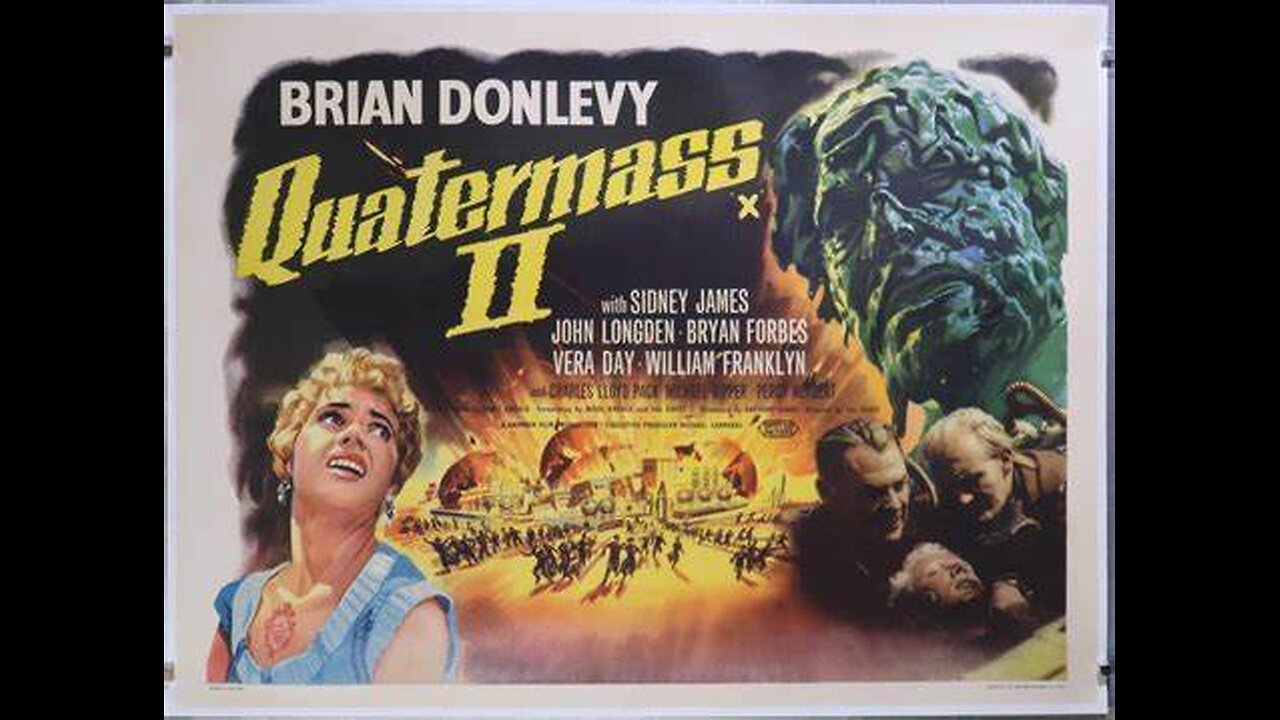Premium Only Content

QUATERMASS II (1958). Colorized feature.
Quatermass 2 (retitled Enemy From Space in the United States and Canada) is a 1957 black-and-white British science fiction horror film drama from Hammer Film Productions. It was originally released in the UK as Quatermass II and was produced by Anthony Hinds, directed by Val Guest, and stars Brian Donlevy with co-stars John Longden, Sidney James, Bryan Forbes, Vera Day, and William Franklyn. Quatermass 2 is a sequel to Hammer's earlier film The Quatermass Xperiment (1955). Like its predecessor, it is based on the BBC Television serial Quatermass II written by Nigel Kneale. Brian Donlevy reprises his role as the eponymous Professor Bernard Quatermass, making him the only actor to play the character twice in a film. It is often erroneously considered as the first film sequel to use the '2' / 'II' suffix within the title, though this distinction belongs to Sanshiro Sugata Part II.
The film's story concerns Quatermass's investigation of reports of hundreds of meteorites landing only in the Winnerden Flats area of the UK. His inquiries lead him to a huge industrial complex, strikingly similar to his own plans for a Moon colony. This top-secret facility is in fact the centre of a conspiracy involving the alien infiltration of the highest echelons of the British Government. Quatermass and his allies must now do whatever is necessary to defeat the alien threat before it is too late.
PLOT
As Professor Bernard Quatermass struggles to gain government support for his Moon colonisation project, his interest becomes focused on reports of hundreds of meteorites landing in Winnerden Flats. Travelling there with Marsh, his colleague, Quatermass finds a huge complex under construction, based on his lunar colony plans. Marsh finds an undamaged meteorite shaped like a small stone rocket. It then cracks open, releasing a gas, leaving him with an odd V-shaped mark on his face. Uniform-clad guards from the complex arrive, armed with sub-machine guns and sporting similar V-shaped marks, and take Marsh away, knocking down Quatermass and forcing him to leave the area.
Trying to discover what happened to Marsh, Quatermass contacts Inspector Lomax, who had previously assisted him ( as seen in The Quatermass Xperiment). Lomax puts him in touch with Vincent Broadhead, a member of parliament, who has been trying to uncover the veil of secrecy surrounding Winnerden Flats and the organization and deliverance of massive quantities of material supplies and manpower without any real explanation as to what it is for. Quatermass joins Broadhead on an official tour of the complex, which he is told has been built to manufacture synthetic food. Slipping away from the visiting party, Broadhead gets inside one of the huge domes dominating the skyline. Quatermass later finds him dying, covered in a poisonous black slime, warning him about what he discovered inside the dome.
Shot at by guards as he exits, Quatermass escapes and rushes to Inspector Lomax, explaining that he believes that the complex is indeed making food, but not for human consumption. Its purpose is to provide a suitable living environment for small alien creatures being housed inside the huge domes. Lomax attempts to alert his superiors, but when he meets the Commissioner of Police, he notices that he, too, is sporting the V-shaped mark; the aliens have taken control of key people in the government.
Quatermass and Lomax then turn to journalist Jimmy Hall, who is skeptical of their story, but asks to visit Winnerden Flats. At the local community centre, they receive a hostile reception from locals employed to do heavy construction and other work at the complex but not told anything more than they need to know. The mood changes, however, when one of the meteorites crashes through the building roof, injuring and infecting barmaid Sheila. Armed guards from the plant arrive and gun-down Hall as he telephones his story into his newspaper. A melee ensues, after which the villagers form a mob that marches on the complex. Rushing the gates, Quatermass, Lomax, and the villagers barricade themselves inside the pressure control room.
Realising that Earth's atmosphere is poisonous to the aliens, Quatermass sabotages their life support system, pumping only pure oxygen into their large domes, suffocating them. Simultaneously, Quatermass' assistant, Brand at the rocket complex, is gunned down by invading Winnerden Flats guards only after he is able to launch an atomic rocket toward the near-Earth asteroid believed to be the alien's staging point. The individual aliens combine their small bodies, creating 150-foot tall masses that soon burst from their three domes. The rocket destroys the asteroid with a nuclear explosion. Their space base destroyed and now being fully exposed to Earth's atmosphere, the giant masses of combined creatures collapse and die. The V-shaped marks disappear from the affected humans, leaving them with no memory of having been under alien control. As they head back to the village, Lomax wonders aloud how he'll make a believable report about all that's happened, while more pointedly, Quatermass questions just how final will that report be...
Production
The first Quatermass film had been a major success for Hammer and, eager for a sequel, they purchased the rights to Nigel Kneale's follow-up before the BBC had even begun transmission of the new serial. For this adaptation, Nigel Kneale himself was allowed to write the first draft of the screenplay, although subsequent drafts were worked on by director Val Guest. The plot is a condensed but largely faithful retelling of the original television serial. The main difference between the two versions is at the climax: in the television version Quatermass blasts off in a rocket to confront the aliens in outer space, whereas in the film the rocket is fired, unmanned, to destroy the aliens' asteroid base. Returning director Val Guest once again employed many cinema vérité techniques to present the fantastic elements of the plot with the greatest degree of realism. Nigel Kneale was critical of the final film, mainly on account of the return of Brian Donlevy in the lead role. Kneale was unhappy with Donlevy's interpretation of the character and also claimed the actor's performance was marred by his alcoholism, a claim denied by Val Guest.
Although Quatermass 2 was financially successful, its box office performance was eclipsed by the massive success of another Hammer film, The Curse of Frankenstein, which was to be the first of their many Gothic horror films. As a result, it would be ten years before Hammer adapted the next Quatermass serial for the cinema with Quatermass and the Pit (1967). Quatermass 2 was, however, the first film for which Hammer pre-sold the distribution rights in the United States, a financial model that would quickly become the norm for subsequent Hammer productions.
-
 58:10
58:10
Kimberly Guilfoyle
7 hours agoAmerica is Back & The Future is Bright: A Year in Review | Ep. 183
44.4K39 -
 3:03:27
3:03:27
vivafrei
12 hours agoEp. 242: Barnes is BACK AGAIN! Trump, Fani, J6, RFK, Chip Roy, USS Liberty AND MORE! Viva & Barnes
92.8K50 -
 8:09:50
8:09:50
Dr Disrespect
10 hours ago🔴LIVE - DR DISRESPECT - MARVEL RIVALS - GOLD VANGUARD
175K30 -
 1:15:00
1:15:00
Awaken With JP
9 hours agoMerry Christmas NOT Happy Holidays! Special - LIES Ep 71
130K104 -
 1:42:21
1:42:21
The Quartering
11 hours agoTrump To INVADE Mexico, Take Back Panama Canal Too! NYC Human Torch & Matt Gaetz Report Drops!
109K92 -
 2:23:15
2:23:15
Nerdrotic
10 hours ago $11.42 earnedA Very Merry Christmas | FNT Square Up - Nerdrotic Nooner 453
86.9K11 -
 1:14:05
1:14:05
Tucker Carlson
10 hours ago“I’ll Win With or Without You,” Teamsters Union President Reveals Kamala Harris’s Famous Last Words
173K333 -
 1:58:31
1:58:31
The Dilley Show
10 hours ago $32.63 earnedTrump Conquering Western Hemisphere? w/Author Brenden Dilley 12/23/2024
137K39 -
 1:09:59
1:09:59
Geeks + Gamers
11 hours agoSonic 3 DESTROYS Mufasa And Disney, Naughty Dog Actress SLAMS Gamers Over Intergalactic
93K21 -
 51:59
51:59
The Dan Bongino Show
12 hours agoDemocrat Donor Admits The Scary Truth (Ep. 2393) - 12/23/2024
852K2.8K